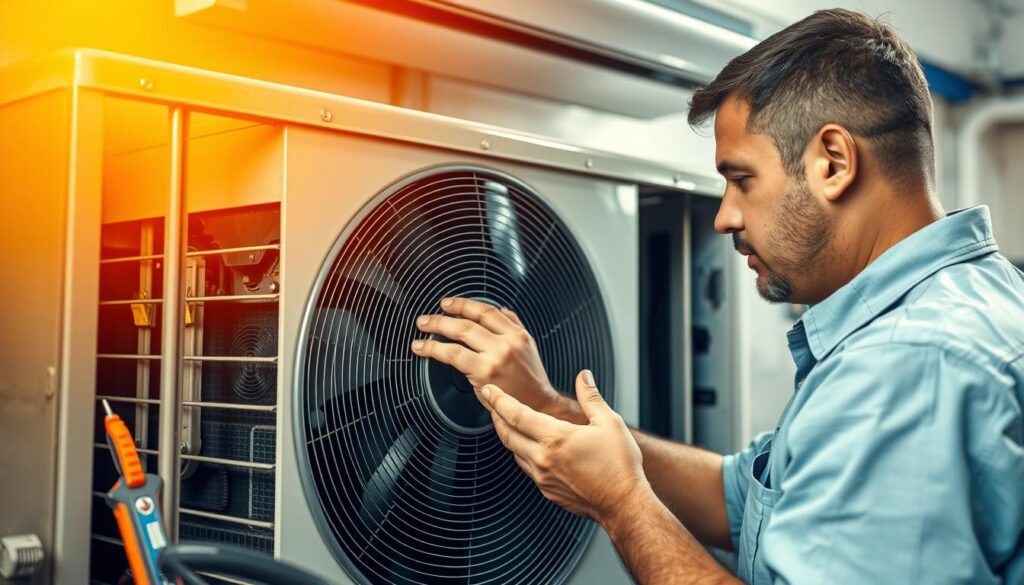- (904) 209-7783
- info@palmsair.com
- Proudly Serving Jacksonville and Nearby Areas
In Jacksonville, FL, 75% of AC breakdowns happen due to poor maintenance. Palms Air’s expert team solves HVAC issues efficiently. We ensure your comfort in Florida’s hot climate year-round.
Quick problem identification is vital when your AC acts up. This guide helps you diagnose common AC problems. We’ll cover frequent issues from strange noises to poor cooling.
Basic AC troubleshooting can save time and money. Many problems come from dirty filters or wrong thermostat settings. You can often fix these issues yourself1.
However, complex problems like refrigerant leaks need professional help. These require safe and effective repairs by experts.
Let’s explore HVAC diagnostics and cooling system faults. This guide will help you tackle common air conditioning issues. You’ll learn to avoid costly repairs and extend your system’s life.
Spotting AC troubles early can save you time and money. Let’s look at some typical cooling system issues homeowners face.
Is your AC not blowing cold air? Dirty filters, low refrigerant, or thermostat problems could be the cause. A tripped breaker or worn blower belt might also be to blame2.
Regular AC checks can stop these problems before they start. Don’t wait for your system to fail before taking action.
Squealing or grinding sounds might mean worn belts or motor bearing issues2. Burning smells could point to motor wiring problems. Musty odors might suggest poor drainage leading to mildew2.
These signs often call for expert cooling system checks. Don’t ignore these warning signals from your AC unit.
Leaks can happen due to bad lines, blocked pipes, or faulty condensate pumps2. Drainage problems often plague room ACs with clogged condensate drains3.
Catching AC compressor issues early can prevent water damage. Keep an eye out for any signs of moisture around your unit.
Is your AC refusing to start? A tripped breaker or bad thermostat might be the culprit2. If it’s always running, known as short cycling, clogged filters or thermostat issues could be at fault2.
These problems often need a pro’s touch. They might stem from refrigerant leaks or electrical issues that require expert handling.

| Problem | Possible Causes | Recommended Action |
|---|---|---|
| No Cool Air | Dirty filters, low refrigerant, thermostat issues | Check filters, schedule professional inspection |
| Strange Noises | Worn belts, motor bearing problems | Professional maintenance check |
| Water Leaks | Blocked drains, faulty pumps | Clear drains, inspect pump |
| System Won’t Turn On | Tripped breaker, faulty thermostat | Check breaker, test thermostat |
Diagnosing AC problems is key to a comfy home. Let’s look at steps to spot common air conditioning issues.
First, check your thermostat settings. Make sure it’s on “cool” and set below room temp. If the AC won’t start, look at the circuit breaker.
A tripped breaker can shut off your AC. You may need an electrician to check it out4.
Dirty filters can cause airflow issues and lower efficiency. Replace them every three months, more often with pets4. Keep all vents open for better cooling.
Check your outdoor unit for debris or damage. Clean around it and ensure good airflow. Look for signs of refrigerant leaks, like ice on lines.
Low refrigerant can cause poor cooling. You might need a pro to fix this4.
Look at circuit breakers and electrical connections. Overloading can trip breakers, causing AC problems. For safety, get a pro if you think there’s an electrical issue4.
Regular HVAC upkeep can stop many common problems. Book a check-up in late spring to prep for summer4.
For tricky issues like refrigerant leaks, call in the experts. They’ll keep your AC safe and working well.
These steps help you spot AC problems and keep it running smoothly. Remember, some fixes are best left to the pros.
Knowing AC troubleshooting basics can save you money on cooling system issues. Window AC units are often easier to fix yourself. For complex problems, consult a licensed HVAC technician.
Common AC repair issues include dirty filters, thermostat problems, and outdoor unit blockages. These can cause short cycling and improper cooling. Regular maintenance is key for optimal AC performance56.
Filter changes and system inspections can extend your unit’s lifespan. They also help keep energy bills in check7. If your AC isn’t cooling well or makes strange noises, it’s time to act.
Some problems are DIY-friendly, while others need professional help. Refrigerant leaks and compressor failures require expert attention. Quick action can prevent severe damage and ensure efficient cooling6.
This guide equips you to handle basic AC troubles. For complex issues, reach out to Palms Air. Our experts provide fast, reliable service to keep your home comfortable.
Need help with your AC? Contact us today for a consultation!
What are the most common reasons for AC breakdowns?
The most common causes include dirty air filters, thermostat issues, refrigerant leaks, and clogged drain lines. Regular maintenance can help prevent these problems.
How often should I replace my AC filters?
It’s recommended to replace your AC filters every three months or more frequently if you have pets or allergies.
Why is my AC making strange noises?
Unusual sounds like squealing or grinding may indicate worn-out belts or motor issues. It’s best to have a professional inspect your unit.
What causes water leaks in an AC unit?
Water leaks can result from clogged drain pipes, faulty condensate pumps, or refrigerant leaks. Regular inspection can help identify and resolve these issues early.